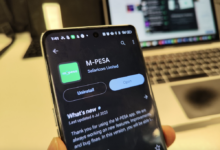How can Africa’s financial services industry become more mobile?

The mobile has proven itself as a major disruptive power within Africa’s financial services industry. Around a billion African consumer are expected to be using mobile banking by 2017 – yet in today’s market, the majority of mobile commerce occurs via platforms owned not by banks, but telecommunications providers.
These platforms have become increasingly sophisticated in how they address the various demands of African consumers and small business owners across multiple countries. Today, more than 85% of African mobile money services offer P2P transfer, bill payment and airtime top-ups. These mobile money accounts have helped fill in the gaps for many traditionally “unbanked” populations but there are still opportunities aplenty for financial services providers to take advantage of mobile disruption.

Many parts of the continent, such as sub-Saharan Africa, have yet to reach the levels of smartphone adoption of countries like Kenya, Nigeria, and South Africa: lessons learnt in these markets can be applied as “first principles” as mobile adoption reaches significant levels. While many platforms like M-PESA are increasingly geared towards m-commerce, smaller and medium-sized businesses typically prefer more assured services (like loans and credit lines) than those offered by mobile P2P lending.
To adapt and thrive in an increasingly mobile-based market, financial services providers should focus on cultivating two core strengths: security, and competitive collaboration.
Banking on trust
Security and trust is perhaps the biggest challenge faced by financial players in the mobile space. Managing user authentication and identities is made all the more difficult when consumers may not even hold a traditional bank account. As banks rollout new value-add mobile services, the complexity of security threats as well as customer service issues increases – a catch 22 when it comes to sustaining long term customers and generating new revenue streams. Nearly half of Kenya’s population, for example, use mobile money to pay bills; at the same time, the country loses around $22 million annually to cybercrime.
Financial services providers have built their reputations on trust since day zero. This is the industry’s unique selling proposition when it comes to mobile finance: banks hold a far more rigorous approach to compliance, assurance, and capital guarantees than do, for example, telcos running mobile money platforms. The continent’s top financial firms are already strengthening their internal checks and balances to accommodate demand for mobile services that need to be more flexible without compromising fidelity. Banks that are not already following suit should do the same.
At the same time, however, banks are less experienced in the areas of data and network security critical to mobile finance – areas in which telcos and technology companies are already well-versed. IBM, for example, has been in partnership with regional telco Airtel to substantially bolster its mobile technology infrastructure, with an especial focus on cloud infrastructure and data security underpinning customer services including m-commerce offerings. In other words, financial services providers can succeed by embracing the spirit of “competitive collaboration”: partnering with their once-competitors in the telco industry.
Don’t reinvent the wheel
To overcome network issues and deliver secure banking services, financial organizations must take an interoperable approach, initiating partnerships with local telecommunications providers. Instead of trying to compete on the platform level, they must leverage existing channels to reach consumers in new ways. A combined approach to security and trust also benefits consumers and businesses in ways that neither side of the financial-telco alliance can deliver alone.
Kenya serves as a great example of how this collaboration proves successful for both banks and consumers. All of its banks have entered into partnerships with one of the country’s two telcos and as a result, have opened doors to new customers and service offerings.
More than nine million accounts have been opened on M-Shwari, the mobile banking service developed by The Commercial Bank of Africa (CBA) and Safaricom, in its first two years. The partnership allowed CBA to introduce its savings and loans services to the 15 million people who had already registered for Safaricom’s text message-based money transfer service, M-PESA, allowing them to open “virtual” accounts with as little as one shilling. Kenyans have now saved US$1.5 billion through the service, accruing interest on what might have otherwise been unbanked and unprotected money.
In exchange for high value, bank-supported financial services, Safaricom leverages its control over the device, networks and infrastructure to manage identity authentication and user profiles. This allows the bank to focus on improving existing offerings, growing its customer base and deepening its relationship with current users.
But the potential opportunities generated by this collaboration are not limited to consumer-facing initiatives. Another solution, resulting from a partnership between Safaricom and KCB, one of Kenya’s largest commercial banks, is targeted at SMEs. Together, they launched a platform that offers financial products including advisory services, loans, insurance, pre-paid cards and credit cards as well as cloud-based services such as HR, accounting and payroll applications – empowering SMEs to grow quickly. For a country in which SMEs employ up to 80 percent of the population and contribute up to 45 percent of the GDP, this collaboration creates an invaluable opportunity for sustained growth.
By linking financial institutions with other major players, such as telecommunication companies, technology partners and payment providers, Africa’s matured financial markets enjoy greater financial inclusion and stability. Playing to their trusted strengths – and harnessing those of telco and tech partners – will enable Africa’s banks to fully embrace mobile channels, improve services and better engage with consumers where they are.
About the Author: The author Faisal Alam is the Managing Partner, IBM GBS East Africa. In this capacity, he leads IBM’s consulting business for the region, where he is focused on expanding IBM’s footprint in the region, as well as addressing some of Africa’s most pressing problems through the fusion of consulting expertise, research expertise, and IBM’s wide array of technology products.



